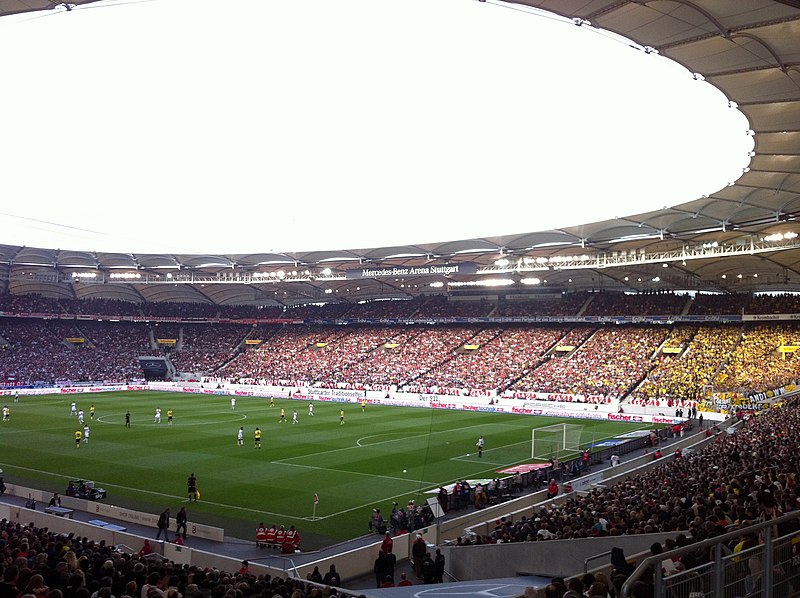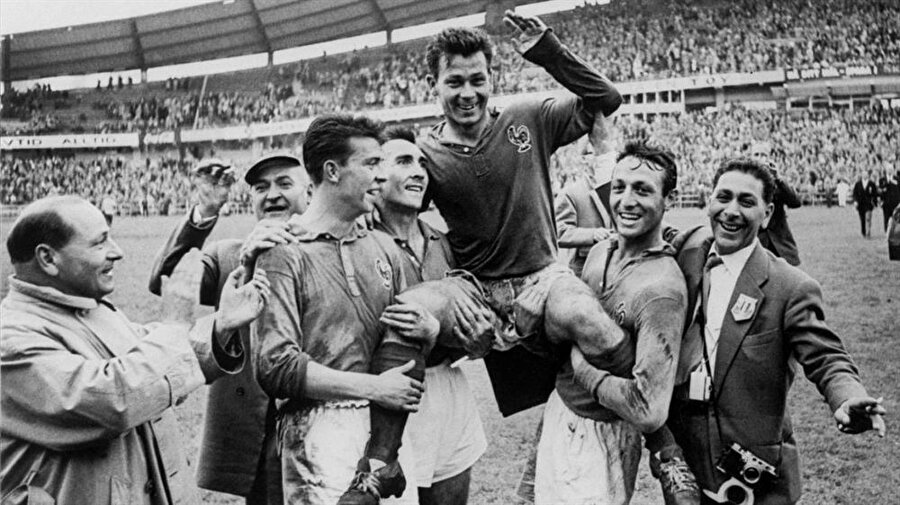UEFA Champions League Winners: 1958-59 Real Madrid

The UEFA Champions League (historically known as the European Cup and mostly abbreviated worldwide as the UCL) is an annual club association football competition organised by the Union of European Football Associations (UEFA) and contested by top-division European clubs, deciding the competition winners through a round robin group stage to qualify for a double-legged knockout format, and a single leg final. It is the most watched club competition in the world and the third-most watched football competition overall, behind only the UEFA European Championship and the FIFA World Cup. It is one of the most prestigious football tournaments in the world and the most prestigious club competition in European football, played by the national league champions (and, for some nations, one or more runners-up) of their national associations.
Introduced in 1955 as the Coupe des Clubs Champions Européens (French for European Champion Clubs' Cup), and commonly known as the European Cup, it was initially a straight knockout tournament open only to the champions of Europe's domestic leagues, with its winner reckoned as the European club champion. The competition took on its current name and format in 1992, adding a round-robin group stage in 1991 and allowing multiple entrants from certain countries since the 1997–98 season. It has since been expanded, and while most of Europe's national leagues can still only enter their champion, the strongest leagues now provide up to four teams. Clubs that finish next-in-line in their national league, having not qualified for the Champions League, are eligible for the second-tier UEFA Europa League competition, and since 2021, for the third-tier UEFA Europa Conference League.
In its present format, the Champions League begins in late June with a preliminary round, three qualifying rounds and a play-off round, all played over two legs. The six surviving teams enter the group stage, joining 26 teams qualified in advance. The 32 teams are drawn into eight groups of four teams and play each other in a double round-robin system. The eight group winners and eight runners-up proceed to the knockout phase that culminates with the final match in late May or early June. The winner of the Champions League automatically qualifies for the following year's Champions League, the UEFA Super Cup, the FIFA Club World Cup and as of 2024 the new FIFA Intercontinental Cup which serves as a replacement for the previous annual format of the Club World Cup.(This format will be changed once again as of 2024)
Spanish clubs have the highest number of victories (19 wins), followed by England (15 wins) and Italy (12 wins). England has the largest number of winning teams, with six clubs having won the title. The competition has been won by 23 clubs, 13 of which have won it more than once, and eight successfully defended their title. Real Madrid is the most successful club in the tournament's history, having won it 14 times and the only club to have won it three times consecutively (in the years 2016, 2017 and 2018), which occurred with Zinedine Zidane as head coach. Only one club has won all of their matches in a single tournament en route to the tournament victory: Bayern Munich in the 2019–20 season. Manchester City are the current European champions, having beaten Inter Milan 1–0 in the 2023 final for their first title.
Cristiano Ronaldo holds the records for most appearances (183), goals (140) and assists (42). Here the link is that has all Cristiano Ronaldo's (GOAT) UCL goals;
https://youtu.be/UK5cu3LJ9qk?si=6gxD9mAmbjZ6KBse
Here are the UEFA Champions League winners up to the 2023-2024 season:
1955-56: Real Madrid1956-57: Real Madrid
1957-58: Real Madrid
1958-59: Real Madrid
1959-60: Real Madrid
1960-61: Benfica
1961-62: Real Madrid
1962-63: AC Milan
1963-64: Inter Milan
1964-65: Inter Milan

1966-67: Celtic
1967-68: Manchester United
1968-69: AC Milan
1969-70: Feyenoord
1970-71: Ajax
1971-72: Ajax
1972-73: Ajax
1973-74: Bayern Munich
1974-75: Bayern Munich
1975-76: Bayern Munich
1976-77: Liverpool
1977-78: Liverpool
1978-79: Nottingham Forest
1979-80: Nottingham Forest
1980-81: Liverpool
1981-82: Aston Villa
1982-83: Hamburg
1983-84: Liverpool


1986-87: FC Porto
1987-88: PSV Eindhoven
1988-89: AC Milan
1989-90: AC Milan
1990-91: Red Star Belgrade
1991-92: FC Barcelona
1992-93: Marseille
1993-94: AC Milan
1994-95: Ajax
1995-96: Juventus
1996-97: Borussia Dortmund
1997-98: Real Madrid
1998-99: Manchester United
1999-00: Real Madrid
2000-01: Bayern Munich
2001-02: Real Madrid
2002-03: AC Milan
2003-04: FC Porto
2004-05: Liverpool
2005-06: FC Barcelona
2006-07: AC Milan
2007-08: Manchester United
2008-09: FC Barcelona
2009-10: FC Internazionale Milano (Inter Milan)
2010-11: FC Barcelona
2011-12: Chelsea
2012-13: Bayern Munich
2013-14: Real Madrid
2014-15: FC Barcelona
2015-16: Real Madrid
2016-17: Real Madrid
2017-18: Real Madrid
2018-19: Liverpool

2020-21: Chelsea


Let's look at the details of 1958–59 European Cup

The 1958–59 European Cup was the fourth season of the European Cup, Europe's premier club football tournament. The competition was won by Real Madrid, who beat Reims 2–0 in the final at Neckarstadion, Stuttgart, on 3 June 1959. This was Real Madrid's fourth European Cup title in a row. The two finalists also competed in the final of the first European Cup in 1956.
It was the first time that a team from Finland participated, while Turkey's representative returned to the competition in the presence of Beşiktaş. They were drawn againts Olympiacos, but Greece's first ever entrants withdrew for political reasons before playing their first tie.
Also, Manchester United were invited to the competition following Munich air disaster in the previous season, but were not allowed to participate by the Football League, meaning that first ever walkovers took place in the UEFA organised competition. Had they played, England would be first nation in European Cup history to have more than one team in the competition, apart from title holder's association.
Teams that participated in the tournament;
A total of 28 teams were placed in the competition bracket, but finally only 26 participated.
Spain continued to be represented by its runners-up, as its champions Real Madrid had already qualified as holders. This was the first time that Rapid Wien and AGF Aarhus failed to qualify for the tournament, which made Real Madrid the only club to appear in all four editions of European Cup. Wiener Sport-Club, Standard Liège, Kjøbenhavns Boldklub, Wolverhampton Wanderers, Helsingin Palloseura, Schalke 04, Drumcondra, Juventus, Jeunesse Esch, VV DOS, Ards, Polonia Bytom, Petrolul Ploiești, Hearts, Atlético Madrid, IFK Göteborg, Beşiktaş and NK Dinamo Zagreb made their debut in the competition.
All entrants were their respective associations champions, except for KB, Manchester United, Polonia Bytom and Atlético Madrid.
Bracket;

Top scorers of the 1958-59 European Cup;

Top scorer of the tournament Just Louis Fontaine;

Just Louis Fontaine (18 August 1933 – 28 February 2023) was a French professional footballer who played as a striker. He scored the most goals ever in a single edition of the FIFA World Cup, with thirteen in six matches in the 1958 FIFA World Cup tournament. In March 2004, Pelé named him one of the 125 Greatest Living Footballers at a FIFA Awards Ceremony.
I highly recommend you to watch a mini documentary about Louis Fontaine that shared by FIFA's official youtube account;
https://youtu.be/74Z6ysO7GzQ?si=R4Cgf6DNT8-SuOVh
Also you can watch his skills and goals video that shared on youtube;
https://youtu.be/x-s_qOkqV9Q?si=-QoIgdrlaF4YLUqC
References;
- Corriere dello Sport, 3 July 1958.
- ^ Manchester United was in pot 2 because they could not play against an English club before the round of 16.
- ^ Corriere dello Sport.
- ^ Gardner, Stewart (18 September 2018). "United's lost 'European Cup' tie with Young Boys". ManUtd.com. Manchester United. Retrieved 18 September 2018.
- ^ "Standard Liège v Hearts, 3 September 1958" . Union of European Football Associations. Retrieved 11 March 2022.
- "Entreprise Fab Amenagement Constructions Sports" [Company Fab Amenagement Constructions Sports] (in French). Manageo. Retrieved 2 February 2019.
- "Just Fontaine". BFM Business (in French). Retrieved 2 February 2019.
- ^ Kaufman, Michelle. "Countdown to the World Cup – Total Soccer, Fútbol Total". MiamiHerald.com. Retrieved 28 April 2011.
- a b "Pele's list of the greatest". BBC Sport. 4 March 2004. Retrieved 18 November 2013.
- ^ "1958 FIFA World Cup star: Just Fontaine". Retrieved 31 December 2016.





















































































